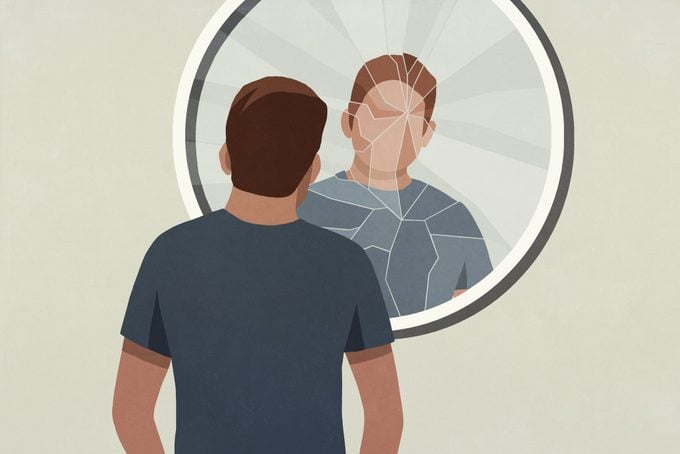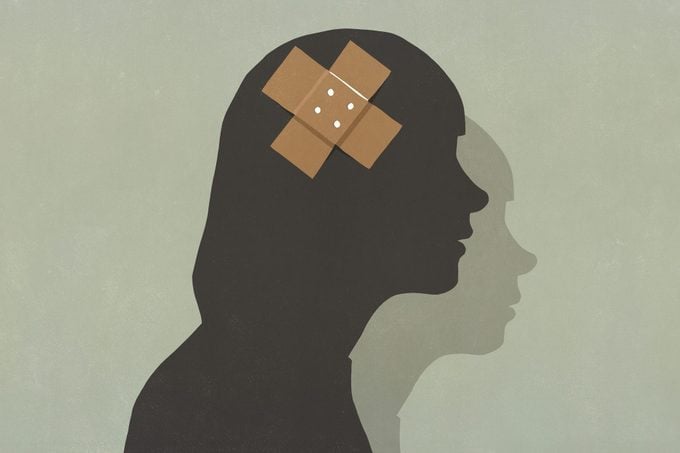How to Forgive Yourself, and Why
Updated: Mar. 07, 2022
We all beat ourselves up over mistakes from time to time—but never forgiving yourself can be brutal to your mental health. Learn more about the art of self-forgiveness, why it's so difficult, and what the experts recommend.
Why making mistakes feels so bad
Whether you blow past your monthly budget or break a friend’s trust, everybody makes mistakes. And what happens next is just as universal: Once we realize we’ve hurt ourselves or someone else, we usually experience negative emotions like shame and guilt.
Researchers believe evolution hardwired these feelings into the human condition. That’s because for our early ancestors, even small mistakes could mean big trouble, such as an unsuccessful hunt, failed protection from the weather or predators, or a life-threatening injury.
In these cases, shame and guilt worked as adaptive responses. The emotions helped us learn from mistakes to increase our collective odds at survival.
But research published in the Proceedings of the National Academy of Sciences suggests guilt and shame didn’t just help us build better structures and detect threats faster. These feelings worked to shape our individual sense of self-worth.
The paper explains how our ancestors deeply counted on one another for survival—and so if an error let down members of the community, it could deem the offender unworthy of help, support, and access to resources.
It’s a theory behind why—many millennia later, when the stakes are generally lower—we still tend to beat ourselves up over even the smallest error (and why bigger missteps can be particularly tough to overcome.)

What is self-forgiveness?
There’s another field of research dedicated to how we handle these feelings of guilt and shame in the aftermath of a mistake. Daryl Van Tongeren, PhD, is an associate professor of psychology at Hope College in Holland, Michigan, who has co-authored several studies looking at this process.
“We were curious about a paradox in self-forgiveness,” he explains.
On the one hand, some people think that by forgiving yourself for a mistake, you’re giving yourself a license to transgress again.
“On the other hand, people view self-forgiveness as being important for mental health,” he says. “Because if you don’t forgive yourself, you get mired in guilt and shame—and that’s not going to lead to any productive change.”
That’s why the experts say self-forgiveness isn’t just a one-and-done action. It’s a process through which we start to replace feelings of guilt and shame—which can quickly create a toxic cycle—with self-compassion, awareness of our wrongdoing, and a desire to change.
“It’s not letting yourself off the hook,” Dr. Van Tongeren explains. “True self-forgiveness, remorse, repentance—it all requires us to engage in some type of effort to make a meaningful change.”
Does self-forgiveness look the same for all mistakes?
We often think about mistakes in terms of how we’ve harmed another person, explains Andrea Marquez, a psychotherapist and LCSW supervisor at Heading Health in Texas.
“In reality, self-forgiveness is a lot broader,” she says. “And more often than not, it involves reflecting on behavior inflicted on ourselves.”
This self-inflicted harm could include trivial errors like overstepping our budget or failing to maintain healthy habits. But it can also extend to more destructive behaviors, like eating disorders or addiction.
Yet sometimes, self-forgiveness is a productive process when we’re not even at fault. As an example, Marquez points to the guilt people can experience over their emotional response to a traumatic event—like a “victim’s shame” following abuse.
Still, our actions often have consequences for other people, too.
While Dr. Van Tongeren says the self-forgiveness process looks similar for all levels of mistakes, “there’s going to be a lot more emotional and cognitive work to do if it’s a bigger offense or one that affects more people.”
Why is it so hard to forgive ourselves?
As it turns out, forgiving others for their transgressions is an evolutionary adaptation, too.
Research published in Frontiers in Psychology explains how our early ancestors were motivated to forgive others based on a survival cost-benefit analysis. They’d weigh the likelihood of someone causing future harm against the long-term benefits of keeping the community intact.
Yet we don’t necessarily offer this same benefit of the doubt to ourselves.
“Because we know ourselves so well—and because we know all the circumstances surrounding the decisions and the mistakes that we have made—we have a tendency to be very harsh as we sit in judgment of ourselves,” says Bradley Nelson, DC, a holistic physician and author of The Emotional Code. “It’s true that the most difficult person to forgive is often our own self.”
Based on his research, Dr. Van Tongeren points to a few explanations for why self-forgiveness so often lies just beyond our reach.
We equate guilt and shame with remorse
Dr. Van Tongeren says people often think: If they’re not self-flagellating or self-denigrating, how will anyone know they’re truly remorseful?
It’s this subconscious idea that suffering through self-blame and shame is a way to pay for our mistakes, Marquez adds. Sometimes, depending on the perceived harm we’ve caused, we might even believe we don’t deserve forgiveness.
“[It’s] akin to a ‘martyr’ mentality,” she says.
We get stuck in a guilt-shame loop
Some people get very accustomed to carrying their shame and guilt, Dr. Van Tongeren explains. This could be due to a range of reasons, such as ingrained cultural standards, cognitive distortions like perfectionism, and health conditions like addiction.
“They internalize [their shame and guilt,] they embody it, and it’s hard for them to let it go,” he says.
As an example, he points to when someone trying to abstain from alcohol decides to have a drink.
“They might feel so much guilt and shame that they say, ‘Well, I’ve already messed up; I might as well not try to pull myself back out. In for a penny, in for a pound,'” he explains.
Then they feel so much guilt about overdrinking that they turn to this problematic, value-inconsistent behavior again the next day to soothe that guilt and shame.
“And so you just get in this cycle,” Dr. Van Tongeren says. “What’s happening is you’re just so mired in the guilt and shame that you’re turning to unhealthy coping responses.”
We’re not sure that we’ve learned our lesson
“I think other people find self-forgiveness hard because we just want to make sure we’re not rushing it,” Dr. Van Tongeren says.
This hesitation lies in uncertainty that we’re not making “the right” or “enough” changes to earn our own self-forgiveness. But by continuing to beat ourselves up and engage in negative self-talk, we add fuel to the shame cycle.
“Going through this journey can also bring back memories of previous mistakes we haven’t fully let go of,” Marquez adds. “We may uncover deeper trauma or underlying thought processes responsible for the behavior we feel guilty about—all of these can be hard to face.”
Why is learning how to forgive yourself important?
In their research published in the Journal of Positive Psychology, Dr. Van Tongeren’s team investigated the benefits behind practicing self-forgiveness.
“Across the studies we found that self-forgiveness really is related to better mental health,” he says.
Self-forgiveness as a mental health tool
Forgiving ourselves doesn’t just knock us out of the guilt-shame spiral, either.
“It promotes a more positive self-image and improves self-confidence,” Marquez explains.
By forgiving ourselves, we make ourselves less vulnerable to other people’s critical remarks. It teaches us to take feedback more constructively instead of feeling personally attacked, which fuels our insecurities.
The physical toll of guilt and shame
A lack of self-forgiveness tends to result in an overall greater stress level as well, Nelson says.
When our stress hormones go on overdrive, our whole body can start to suffer. These effects can include:
- a lowered immune system—so you’re more likely to get sick
- higher blood sugar and blood pressure levels
- upset stomach and digestive issues
“We don’t sleep as well, we don’t get along well with others as well, and our ability to really be truly happy and to experience joy becomes very difficult to come by,” he says.
Can you forgive yourself too quickly?
“Guilt or regret can be adaptive when we fully process it,” says Sarah Kaufman, LMSW, a psychotherapist at Cobb Psychotherapy in New York.
“When we act as detectives, trying to figure out why we feel guilty or why we regret something, we can start to uncover why we do what we do and where we want to go,” she says. “But that’s the thing—we have to be aware of what we do and why we do it. We can’t change what we don’t understand.”
That’s why the experts say it doesn’t really matter how quickly you forgive yourself for making a mistake. The important thing is to engage in thoughtful self-reflection:
- How did my actions cause harm?
- How do I feel about that?
- How would I like to move forward?
“This self-reflection process doesn’t necessarily have a set amount of time to make it effective,” Kaufman says. “It’s about internalizing the thoughts and feelings that come up.”

How to forgive yourself
While there’s no set time frame for self-forgiveness, that doesn’t mean you rush right through it.
“You need to think deeply about your actions and who they harmed—yourself and other people—and you need to own that,” Dr. Van Tongeren says. “And that part is hard.”
Here’s what the experts say on how to move through this process in a positive, effective way.
Start by showing yourself some compassion
Self-compassion means being able to look at yourself—and your actions—in an unbiased, understanding, and accepting way.
“We don’t often extend the same compassion to ourselves that we extend to other people,” Dr. Van Tongeren says.
For example, everyone gets a bit annoyed if a friend is late to dinner. But once they arrive and apologize, most of us don’t find it that difficult to move past the annoyance.
“But some of us hold ourselves to such a higher standard than we do other people,” Dr. Van Tongeren says. So, even if someone else has forgiven us, we continue to beat ourselves up for a mistake.
That’s why without self-compassion, healthy remorse can easily become unhealthy rumination—when you’re unable to stop obsessing over thoughts of what went wrong.
“[This] can sometimes lead to prolonged feelings of shame or guilt,” Kaufman says. “And it can make it more difficult to find acceptance and move forward.”
Follow the four R’s of self-forgiveness
The “four R’s” is a therapeutic model for self-forgiveness—and research published in the Journal of Counseling Psychology backs up its effectiveness.
The study shows this model helped people not only forgive themselves over a specific offense, but experience a greater sense of well-being overall.
It looks like this:
Responsibility
Self-forgiveness starts with the recognition you did something wrong, Dr. Van Tongeren explains. It’s important to avoid the urge to shift blame, and to instead claim ownership over your mistake.
Taking responsibility may even be a powerful way to let go of guilt, Marquez adds.
“Oftentimes, it reveals that we have done less harm than imagined.”
Remorse
Remorse simply means feeling sorry for what we’ve done, Nelson explains.
“This grief or sorrow is what powers our commitment to not make the same mistake again,” he says.
But it’s important to understand the limits of your own remorse. That means recognizing when your emotional response goes beyond the bounds of your responsibility—like feeling guilt or shame over a problem you didn’t cause.
“You can only control what you can control,” Kaufman says.
Restoration
Restoration is making an attempt to repair what was lost because of your mistake.
For example, if you had a weak moment and stole something, restoration would mean giving back what you stole, Nelson says.
But sometimes, there’s nothing physical to restore—like if you snap at a partner or co-worker. In this sense, restoration is the accountability you accept and the apology you offer.
Renewal
Overlooking this step is one pitfall of self-forgiveness. The process isn’t that productive if we decide to forgive ourselves without committing to any sort of change, Dr. Van Tongeren says.
“In this [renewal] step, we can pause and think about the whole process that started with the mistake that we made,” Nelson says. “We can ask ourselves why we made the mistake in the first place and what we can do to prevent it from happening again.”
Don’t sweat the small stuff
Another pitfall of self-forgiveness? Sometimes we simply blow our missteps out of proportion.
“Some mistakes are just that—genuine mistakes,” Marquez says. We don’t necessarily need to find meaning, action points, or lessons in every error we make.
“[But sometimes,] it might be harder to accept that without having a positive outcome in the form of a lesson learned,” she says.
This tendency is common among people who experience cognitive distortions like perfectionism—and according to a report in BMC Psychiatry, it may be a sign of generalized anxiety disorder.
That’s why if you’re having trouble showing yourself compassion or find yourself obsessing over every mistake you make, it may be time to turn to professional support.
Therapeutic practices like cognitive behavioral therapy can help people work through feelings like guilt and navigate the steps to self-forgiveness—while retraining the thought processes that encourage negative emotions in the first place.
Now that you know about how to forgive yourself, check out how to control anger.






















